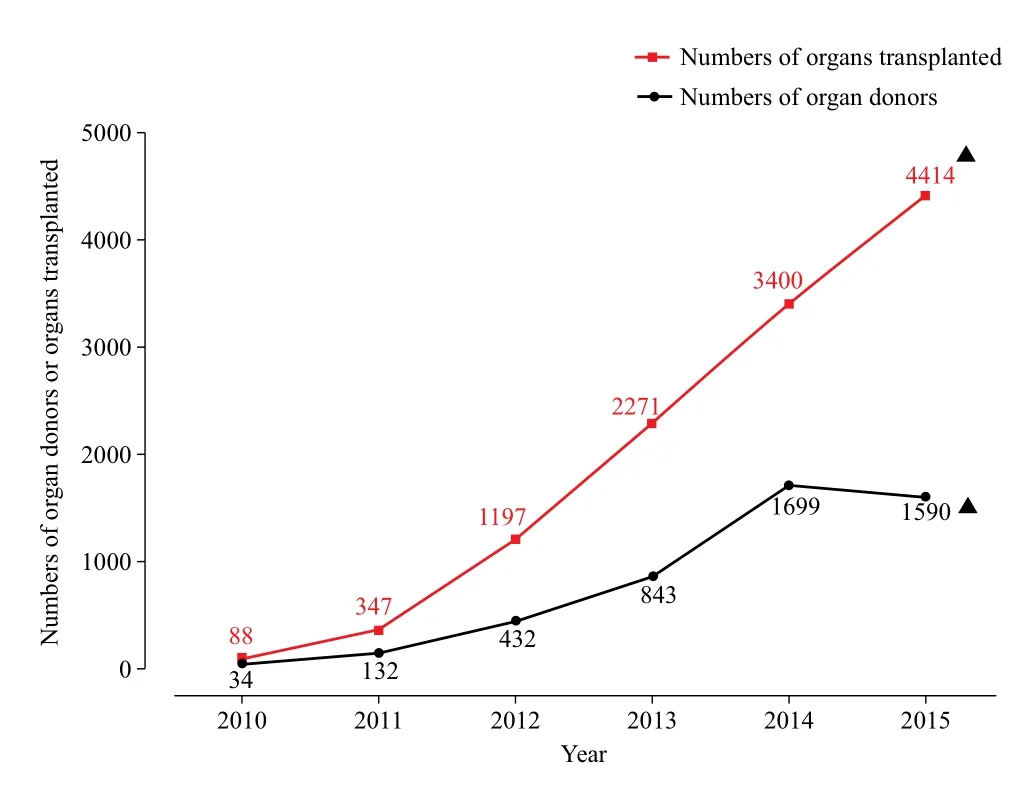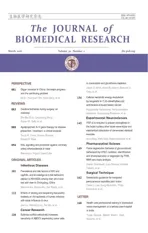Organ donation in China: the major progress and the continuing problem
2016-12-13NiAnYuanyuanShiYaboJiangLinlinZhao
Ni An, Yuanyuan Shi, Yabo Jiang, Linlin Zhao
1Postgraduate Studies, Eastern Hepatobiliary Surgery Hospital, Shanghai 200433, China;
2Department of Foreign Languages, the Second Military Medical University, Shanghai 200433, China.
Organ donation in China: the major progress and the continuing problem
Ni An1,Δ, Yuanyuan Shi1,Δ, Yabo Jiang1, Linlin Zhao2,✉
1Postgraduate Studies, Eastern Hepatobiliary Surgery Hospital, Shanghai 200433, China;
2Department of Foreign Languages, the Second Military Medical University, Shanghai 200433, China.
China has banned harvesting organs from executed prisoners since January 1st, 2015[1], making voluntary donation the only legitimate venue for organ transplant. It is a critical move to settle all the controversies about China's organ transplant process by making a loud and strong statement worldwide that the Chinese government respects human rights and is streamlining its organ transplant process to conform with internationally accepted standards on organ transplantation. This regulation removes one major obstacle of organ transplant in China; however, China still faces the other major obstacle of critical organ shortage.
China has built the organ donation system since 2010[2], and the number of organ donors and organs transplanted has been increasing steadily and rapidly in the past six years according to the data from the China Organ Donation Administrative Center (Fig. 1). Until November 23rd, 2015, there have been 4933 cases of successful voluntary deceased organ donation in total. However, it is still far from meeting the demand of organ transplants by patients. According to the statistics, the deceased organ donation rate in China currently is only about 0.6/1,000,000 China citizens, one of the lowest in the world[3]. The sad truth is that there are about 1 to 1.5 million people in China needing organ transplant every year and only 10,000 people can get a new organ successfully.
It is time that we should figure out the exact reasons that hold Chinese people back from organ donation. With the development of economy and society, the traditional cultures and beliefs are no longer the dominant impedance to the public's willingness to donate[4]. A recent survey on organ donation among the healthcare professionals in 8 hospitals in Dalian and Chaozhou between October 2013 and January 2014 found that only 19.6% of the participants knew where to donate organs and only 13.7% knew the procedure of organ donation, indicating a severe lack of basic knowledge about organ donation even among those who work in hospitals[5]. Therefore, people not understanding and harboring concerns over organ donation are one of the key factors.

Fig. 1 The number of voluntary organ donors and organs transplanted in China from 2010 to 2015. ▲These numbers are calculated until August 2015. Data were obtained from the China Organ Donation Administrative Center.
China has launched its official organ donation registration websites www.savelife.org.cn or www.rcsccod.cn in 2014. Citizens can register as organ donors via www. savelife.org.cn or www.rcsccod.cn. The donated organs are allocated automatically through the China Organ Transplant Response System[6], strictly following the rule of the Basic Principles of Chinese Human Organ Distribution and Sharing and the Core Policy of Liver and Kidney Transplantation to prevent human intervention and ensure fairness and transparency. Donors may have concern over whether doctors will try their best to save them if they have registered as an organ donor. In fact, doctors responsible for saving a donor are completely separated from the professionals responsible for harvesting organs[7].
With the aims of raising the public awareness of organ donation and further improving the legal system, the first national guideline on organ donation of China was published in August 2015[8]. However, aside from building the organ donation system and optimizing the legal system, China should do more. The measures should include strengthening education to remove misunderstanding and promote medical knowledge, use public service advertisement to educate and enlighten people about organ donation and provide more opportunities for people to choose whether they wish to donate or not. We should also make better use of the network of social media, such as, put a link in WeChat so that when people open their digital wallet, they can see the option of "organ donation". Through these ways, organ donation will gradually become an inseparable part of daily lives.
Saving lives requires joint efforts of the medical community and the public and with the continuing efforts of the government, hospitals and physicians and the public, more trust and understanding of organ donation will be established. The public will have more faith in China's organ transplant system.
References
[1] China to end prisoner organ harvesting on Jan.1, 2015. Available at http://english.cntv.cn/2014/12/05/ VIDE1417732084335881.shtml. Accessed on Oct 14, 2015.
[2] Shang X, Zhang M. Body and organ donation in Wuhan, China[J]. Lancet, 2010,376:1033-1034.
[3] Zhang GY, Liao T, Fu XB, et al. Organ transplantation in China: concerns remain[J]. Lancet, 2015,385:854-855.
[4] Sun Q, Gao X, Wang H, et al. A new era for organ transplantation in China[J]. Lancet, 2014,383:1971-1972.
[5] Dongmei Hu, MS, Hai Huang, et al. Knowledge, attitudes, and willingness toward organ donation among Health professionals in China[J]. Transplantation, 2015,99(7):1379-1385.
[6] Huang J, Wang H, Fan ST, et al. The national program for deceased organ donation in China[J]. Transplantation, 2013,96(1):5-9.
[7] Huang J, Millis JM, Mao Y, et al. A pilot programme of organ donation after cardiac death in China[J]. Lancet, 2012,379:862-865.
[8] chinatodaynews 035 ORGAN DONATION GUIDE. Available at http://english.cntv.cn/2015/08/23/VIRE1440280209637149. shtml . Accessed on Oct 14, 2015.
This paper was presented on the Seventh English Forum on Medical Humanities at the Second Military Medical University, Shanghai, China, on November 14th, 2015.
ΔThese authors contribute equally to this paper.
✉ Linlin Zhao, Department of Foreign Languages, the Second Military Medical University, No. 800,
Xiangyin Road, Shanghai 200433, China. Tel: +86-21-81870931, E-mail: zhaolinlin979@163.com.
24 November 2015, Revised 30 November 2015, Accepted 20 December 2015, Epub 03 February 2016
R617, Document code: B
The authors reported no conflict of interests.
杂志排行
THE JOURNAL OF BIOMEDICAL RESEARCH的其它文章
- Cerebral ischemia during surgery: an overview
- Apolipoprotein A-V gene therapy for disease prevention / treatment: a critical analysis
- HDL signaling and protection against coronary artery atherosclerosis in mice
- Prevalence and risk factors of HIV and syphilis, and knowledge and risk behaviors related to HIV/AIDS among men who have sex with men in Chongqing, China
- Effects of closing and reopening live poultry markets on the epidemic of human infection with avian influenza A virus
- Sulindac sulfide selectively increases sensitivity of ABCC1 expressing tumor cells to doxorubicin and glutathione depletion
